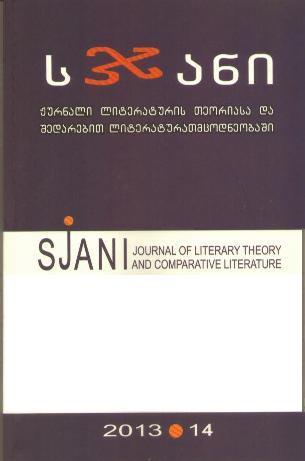პოსტმოდერნისტული რომანის პოეტიკა (Summa postmodernica)
Poetics of the Postmodern Novel (Summa postmodernica)
Author(s): Konstantine BregadzeSubject(s): Literary Texts
Published by: ლიტერატურის ინსტიტუტის გამომცემლობა
Keywords: postmodernism; novel; poetics; antilogocentrism; deconstruction.
Summary/Abstract: Poetics of the Postmodern Novel (Summa postmodernica) Summary Key words: postmodernism, novel, poetics, antilogocentrism,deconstruction. The following poetic principles can be distinguished in post-modern novel: a) A priori Antilogocentrism, showing inexpediency and irrelevance of establishing axiological paradigms and of pursuing one’s striving for the truth; b) Pathos of Deconstruction, negating ideological and aesthetic positions oriented towards logos, i.e. towards the metaphysical proto-concept and urging for their deconstruction; c) Onto-textuality, “establishing” a complete ideological and mimetic isolation/ distance from existence/ the outer world and “defining” oneself as an original and discrete hyper-reality; d) A priori aspiration for an artistic game – artistic “pleasure” of eternal textbuilding, called by Barthes “the pleasure of the text” (“Le plaisir du texte”). As a result, postmodernistuli romanis poetika (Summa postmodernica) post-modern novel appears as a text gadget, a playing tool, an end in itself, endlessly and aimlessly assembled and disassembled by the author, who, together with the reader, indulges in intellectual pleasure. In fact, this very gadgetedness is the sense of post-modernist text (for example, U. Eco’s “The Name of the Rose” is based on the principle of semiotic gadgetedness). e) The above-mentioned leads to a priori simulacrity of a post-modernist novel that focuses only on signifiers aiming at the establishment of the shallowness of a text and fully rejecting its essence, the signified. f) Inter-Textuality, expressed through a quotation, paraphrase, imitation or allusion to a classical text and aimed to reject mono-semantics and establish correlative polysemantic meanings, or to parody and defy classical texts; g) Metafictionality, which emphasizes the absolute fictional quality of post-modernist texts, and highlights its textual construct; on the other hand, metafictionality foregrounds the falsity and simulacrity of stories and ideas, which is explicitly pointed out either by the author/ narrator or by the protagonist. This focus on simulacrity is aimed to cause the reader’s/recipient’s estrangement to the text, thus preventing him/her to develop the illusion of authenticity of the stories and start looking for an implicit supreme design beyond the text. On the contrary, metafictionality is aimed to keep the reader involved in text building together with the author throughout the text; h) The principle of double (triple and etc.) coding (German Verschachtelung) – complete blurring of post-modernist text or for the establishment of pluralism of different essences and indistinguishability. i) Risomaticism, aimed at the establishment of correlative semantic pluralism (semantic polyphony of the text); j) Follow-ups/spinoffs/new versions of classical texts that parody the latter, destroying its logo-centric positions and paradigms of values;
Journal: სჯანი
- Issue Year: 2013
- Issue No: 14
- Page Range: 58-76
- Page Count: 18
- Language: Georgian

